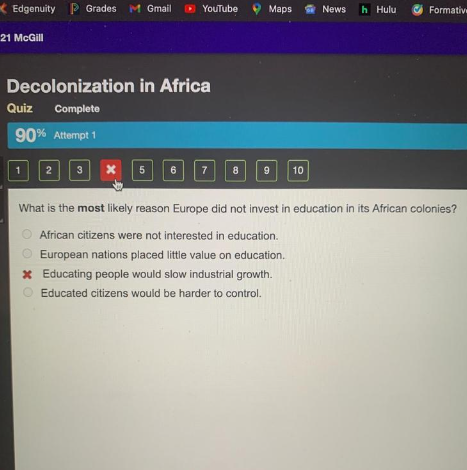What is the Most Likely Reason Europe Did Not Invest in Education in Its African Colonies? Colonial Neglect Revealed

The most likely reason Europe should have invested in education in its African colonies was the prioritization of resource extraction over local development. Colonial powers focused on short-term economic gains rather than the long-term benefits of education.
Throughout the era of colonialism, European nations established empires across the African continent, exploiting its vast resources and labour. They managed these territories with the primary goal of maximizing profits and fueling their industrial growth. Education, a crucial tool for empowerment and development, received minimal attention as it did not align with their extractive economic strategies.
Instead of building schools and nurturing intellect among the local populace, colonizers aimed to maintain a workforce that was skilled just enough to serve their immediate needs. By doing so, they could ensure a steady flow of raw materials to their home countries, bolstering European economies at the expense of African development. This strategic disregard for education in African colonies set back generations and left a profound legacy of challenges in the post-colonial era.
Contents
- 1 Colonial Goals In Africa
- 2 Education Systems: A Tool For Subjugation
- 3 Economic Considerations And Colonial Priorities
- 4 Manipulating Local Culture And Knowledge
- 5 Social Control And The Illusion Of Development
- 6 Resistance To Educated African Elites
- 7 International Pressure And Educational Reform
- 8 Legacy Of Educational Neglect In Post-colonial Africa
- 9 Conclusion: Understanding The Lasting Impact
- 10 Conclusion
Colonial Goals In Africa
Colonial Goals in Africa delved into resource wealth and strategic dominance. European colonizers eyed Africa’s rich reserves and sought control over lands and peoples. Education did not align with these goals. It might even empower and enlighten the colonized, potentially threatening the colonial grip and economic interests. Let’s explore these intentions further.
Resource Extraction And Exploitation
Europe’s main aim in African colonies was extracting priceless resources. To this end, a complex education system needs to be revised. They needed labour, not scholars.
- Raw materials: Africa offered metals, diamonds, and crops.
- Forced labour: Colonizers coerced Africans to toil in mines and plantations.
- Minimal investment: Only basic training was provided to maintain a workforce.
The focus was on maximizing profit rather than developing local intellect and skill.
Strategic Control And Power Dynamics
European powers wielded control through military and administrative dominance. They feared educated locals might challenge this order.
- Maintain dependency: By keeping education at bay, colonizers ensured reliance.
- Suppress uprisings: An uneducated population was less likely to organize rebellions.
- Imperial culture: Limited education imposed European values and culture, stifling local identity.
Education is equated to power. Keeping it scarce in African colonies was a deliberate move to sustain European supremacy.
Education Systems: A Tool For Subjugation
Colonial powers often used education to control populations. In Africa, European colonizers set up systems that did not prioritize genuine learning. Instead, they focused on creating a workforce that could only perform menial jobs. Complex education that promoted critical thinking was rare. This tactic ensured they maintained power and economic dominance.
Infrastructural Neglect
Many European colonizers needed to build adequate schools. They focused on profit rather than on education. African colonies saw few investments in classrooms, libraries, or learning materials. This neglect left a lasting impact. Even after gaining independence, countries needed help to build strong educational foundations.
Limited Curriculum Focused On Subservience
The curriculum in African colonies was narrow. It did not encourage innovation or leadership. Instead, it emphasized basic skills. These skills suited lower-tier jobs. The goal was to train locals to serve, not to challenge. As a result, generations missed out on broader knowledge. They could not quickly progress beyond positions intended by their colonizers.
Let’s explore these themes further:
| Aspect | Details |
| School Infrastructure | Limited investment in physical and educational resources. |
| Education Focus | Curriculums created a subservient and unempowered workforce. |
| Long-term Effects | A continued struggle for educational reform and empowerment post-independence. |
In the following sections, we will delve into how these issues manifested. We’ll see their impact on people’s lives.
Economic Considerations And Colonial Priorities
The drive behind Europe’s colonial pursuits was primarily grounded in economic gain. These colonial powers often viewed education as a non-priority, focusing instead on sectors directly linked to financial profit. Let’s delve deeper into the economic reasons restraining the investment in education within African colonies.
Cost-saving Measures
Colonial rulers aimed to maximize profits while reducing expenses. Education was seen as a luxury that did not promise immediate financial returns. They limited educational facilities and focused on basic literacy to train local clerks as a cost-saving measure.
Investment Directed Towards Profitable Sectors
Colonial budgets were strategically allocated to sectors that would boost the economy and enhance resource extraction. This meant investing in infrastructure like roads and railways, which facilitated the movement of goods rather than the natives’ education. Extraction industries received the most attention, ranging from mining to agriculture, emphasizing the era’s profit-oriented mentality.
| Breakdown of Colonial Investment Priorities | |
| Priority Sector | Reason for Investment |
| Infrastructure | Transports goods to ports |
| Extraction Industries | Produces raw materials |
| Administrative Systems | Controls local populations |
Manipulating Local Culture And Knowledge
Colonial powers in Africa often ignored local education. They did this for control. Understanding the local mindset helps reveal why Europe chose not to invest in African education.
Suppressing Indigenous Learning
Europe aimed to limit traditional African education. This move kept African knowledge from spreading, but it made space for European ideas. Schools taught in European languages and perspectives, pushing out local wisdom.
- Banned native teachings: Stories, histories, and skills passed down were blocked.
- Closed local schools: Places where kids learned from elders shut down.
- Rewarded assimilation: Those who adopted European ways got better treatment.
Promoting European Cultural Dominance
Colonial rulers pushed European culture as superior. They replaced local content with Western subjects, ensuring European values stuck in young minds.
| European Curriculum Focus | Effect on African Cultures |
| History from Europe’s view | Made the African past seem less important |
| Western literature and art | Reduced interest in African creativity |
| Foreign languages | Made communication in native tongues rare |
Social Control And The Illusion Of Development
‘Social Control and the Illusion of Development’ offers a critical lens through which to examine the historical landscape of education—or the lack thereof—during colonial times. Education stands as a beacon of progress, yet for European colonizers in Africa, this symbol was manipulated. It served more as a curtain, veiling the true intentions behind their limited investment in the educational systems of their African colonies.
Managing The Labor Market
Quality education creates a knowledgeable workforce. Colonizers knew this well. Yet, they nurtured a system where only rudimentary skills were taught. Europeans designed educational systems that maintained a specific labour hierarchy. Basic education kept the local populace in low-wage jobs, which were essential for the colonizers’ economies to thrive. Africans with limited education were perfect candidates for manual labour and other menial tasks that supported colonial infrastructure and industries.
Education As A Token Of ‘civilization’
Europeans often justified colonialism by claiming they were bringing ‘civilization’ to African societies. To the outside world, any investment in education was lauded as a generous act. Yet, this ‘civilizing mission’ was a veneer. School curricula were intentionally restricted to prevent true empowerment. Subjects like critical thinking and leadership were often omitted. Instead, schooling focused on creating just enough illusion of development to appease international observers and local elites while preserving the status quo.
Resistance To Educated African Elites
The ‘Resistance to Educated African Elites’ unveils a strategic bend in historical narratives. Colonial powers restrained educational investments in Africa for fear of creating a class that could challenge their rule. This section delves into the underlying reasons for such a cautious stance.
Fear Of Anti-colonial Sentiment
Colonizers knew education sparks critical thinking. Educated minds could question and oppose foreign dominance. European rulers needed more education to prevent the growth of such insights.
They believed educated Africans would unite under common causes against colonial rule. Knowledge threatened the established order, potentially leading to organized resistance.
Citizens exposed to Western political ideals could aspire to democracy and self-governance. Colonial authorities kept education basic to avoid such transformations.
Controlling The Rise Of Nationalism
The rise of nationalism posed a direct challenge to colonial power. Nationalist movements across Africa sought independence from European rule. Limiting education was a strategic move to suppress such movements. By curtailing higher education, colonizers aimed to control the emergence of nationalist leaders.
Europeans focused on vocational training over academic education, which was intended to produce a workforce rather than thinkers. They allocated fewer resources to institutions that could foster a sense of national identity or unity.
International Pressure And Educational Reform
International Pressure and Educational Reform played pivotal roles in reshaping education within African colonies. European colonizers initially neglected educational investment for various strategic reasons. Colonized nations started to witness educational advancements only when external conditions impacted colonial policies.
Role Of Missionaries And Philanthropic Organizations
Missionaries and philanthropic groups were crucial for education in Africa. Their role often filled the gaps left by the colonial governments. They established schools and provided rudimentary education, which was mostly the only formal education available.
- Focused on religious teachings – Their curriculum emphasized religion.
- Served as community centres – Schools became hubs for communal activities.
- Limited secondary education – Few institutions offered higher education.
Gradual Shifts Due To External Influences
The trajectory of education in African colonies changed when international dynamics shifted. Post-World War II sentiments and the push for decolonization influenced European policies. Externally, critics and international bodies demanded more investment in local education systems.
| Influence | Outcome |
| UNESCO Initiatives | Increased funding for education |
| Global Human Rights Movement | Focus on universal education rights |
| Independence Movements | Local control over educational systems |
Colonial governments responded slowly to these pressures. They started building more schools and training teachers. This shift was gradual but marked the start of educational reforms.
Legacy Of Educational Neglect In Post-colonial Africa
The legacy of educational neglect in post-colonial Africa traces back to European colonial policies. European powers often viewed their colonies as sources of raw materials rather than places for human capital development. As a result, investment in education remained minimal. This historical oversight has had lasting effects on the continent’s ability to provide quality education to its population.
Challenges In Modern Education Systems
Today, African nations grapple with the consequences of past educational neglect:
- Underfunded schools need help to provide basic educational materials.
- Limited access to education, especially in rural areas, hinders equitable learning opportunities.
- Low teacher-student ratios and poorly trained educators impact the quality of education.
- Many countries face a curriculum that needs to reflect local needs and languages.
These challenges reflect deeply on the societal and economic development of post-colonial Africa.
Rebuilding And Reform In The Post-colonial Era
Post-colonial governments must tackle the remnants of educational neglect. Steps towards progress include:
- We are investing in educational infrastructure to create conducive learning environments.
- Recruiting and training teachers to improve the teacher-student ratio and quality of education.
- It is developing curricula that cater to the local context and embrace indigenous knowledge systems.
- We are enhancing adult literacy programs to mitigate the effects of historic educational gaps.
Such efforts are crucial to break the cycle of poverty and underdevelopment tied to educational neglect.
Conclusion: Understanding The Lasting Impact
European powers once overlooked education in their African colonies. This oversight left a lasting scar. To truly grasp the depth of this impact, one must consider its present-day consequences and the path to recovery.
Evaluating The Consequences For Contemporary Africa
Years of educational neglect in colonial Africa have rippled into the present. Many African nations face challenges due to this historical gap:
- Limited access to quality education
- Poverty linked to lower education rates
- Development hindered by skill shortages
Africa’s youth strive to overcome a legacy that stunted their ancestors’ potential. This struggle affects economic growth and societal progress.
The Road To Educational Recovery And Empowerment
The journey to educational redemption is underway. Robust strategies help heal past wounds:
- Invest in teacher training and schools
- Introduce technology for modern learning
- Strengthen policies that support education for all
A brighter future hinges on the empowerment of today’s learners. The commitment to reinventing education systems paves the way for progress.
Conclusion
Exploring the reluctance of European colonizers to promote education in their African territories uncovers nuanced historical dynamics. It highlights a strategic choice aimed at maintaining control. Ultimately, the resistance to investing in local education systems underscored an oppressive colonial agenda that prioritized exploitation over empowerment.



